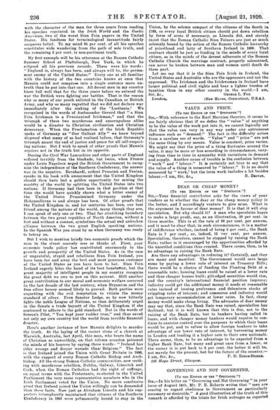DEAR OR CHEAP MONEY?
(To THE EDITOR OP THE " SPECTATOR-"I
Stn,—Your financial contributor asks for the views of your readers as to whether the dear or the cheap money policy is the better, and I accordingly venture to give mine. What is the argument in favour of dear money? It is that it will stop speculation. But why should it? A man who speculates hopes to make a large profit, say, as an illustration, 20 per cent. in three months. This is at the rate of 80 per cent. per annum, and it must be clear that, in such circumstances, it is a matter of indifference whether, instead of being 5 per cent., the Bank Rate is 7 per cent., or, indeed, 15 ner cent. per annum. Speculation, therefore, cannot be stopped by raising the Bank Rate; rather is it encouraged by the opportunities afforded by the unsettled conditions thus created. There seems, then, to be no advantage in raising the Bank Rate.
Are there any advantages in reducing it? Certainly, and they are many and manifest. The Government would save large sums by paying a lower rate of interest on Treasury Bills; there would be a chance of funding the Floating Debt at a reasonable rate; housing loans could be raised at a lower rate and thus cheaper houses built; gilt-edged securities would rise, and the country's international financial position improve; industry could get the additional money it needs at reasonable rates instead of issuing preference and debenture stocks at crippling rates of interest; and commerce and industry would get temporary accommodation at lower rates. In fact, cheap money would make cheap living. The advocates of dear money may say that, since the Bank Rate was raised, speculation has declined; but it is well known that this is due, not to the raising of the Bank Rate, but to bankers having called in loans, and with cheaper money bankers would require to con- tinue to exercise control over the purposes to which their loans would be put, and to refuse to allow foreign bankers to take advantage of our lower rate of interest, by borrowing money in London and lending it a higher rate to their own nationals. There seems, then, to be no advantage to be expected from a higher Bank Rate, but many and great ones from a lower, so the sooner it is put back to 5 per cent. the better it will be, not merely for the present, but for the future of the country.—


































 Previous page
Previous page